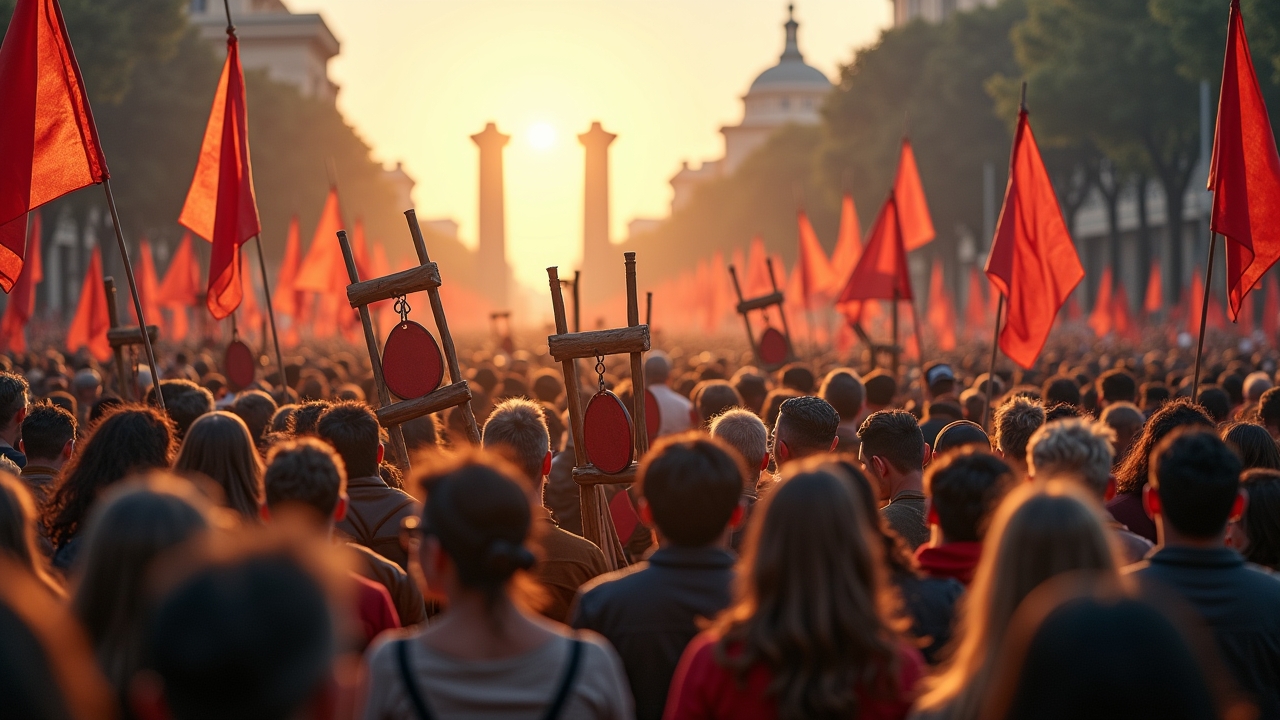PROTECT YOUR DNA WITH QUANTUM TECHNOLOGY
Orgo-Life the new way to the future Advertising by AdpathwayAnalysis of the Protest in Speaker Johnson’s Office
The recent disruption in House Speaker Mike Johnson’s office by Democratic lawmakers highlights escalating tensions in Washington, D.C. The incident, which revolved around the swearing-in of Rep.-elect Adelita Grijalva, was not just a protest but a stark illustration of a political environment increasingly defined by spectacle and confrontation.
Democrats stormed Johnson’s office demanding Grijalva’s immediate ceremony following her special election victory in Arizona. Their actions were not spontaneous; they transpired amidst a larger struggle over a crucial vote related to Jeffrey Epstein’s criminal files—a measure that needs Grijalva’s support. The chaotic scene involved shouting, confrontations with Capitol Police, and even property damage, illustrating a breakdown of norms typically observed in such settings.
Speaker Johnson condemned the outburst as a calculated political stunt, criticizing not only the behavior of the lawmakers but also their treatment of law enforcement officers. In his own words, the incident marked a “crossing [of] lines of decorum and respect.” Johnson described how the lawmakers berated the Capitol Police, questioning the growing animosity some politicians appear to have toward law enforcement. This sentiment resonates with broader concerns about how political tensions are spilling over into disrespect for essential services designed to keep order on Capitol Hill.
Video footage from this confrontation adds a visual dimension to the chaos, showcasing prominent figures such as Reps. Pramila Jayapal and Melanie Stansbury engaged in a standoff with law enforcement. The lines of authority blurred significantly that night when lawmakers linked arms and chanted slogans, demanding Grijalva’s swearing-in while police struggled to maintain order. It is rare to see such open defiance in the heart of American governance, bringing to mind past controversies where decorum was also pushed aside for political theatrics.
The significance of Grijalva’s swearing-in extends beyond procedural norms. Her vote is pivotal in a bipartisan initiative aimed at demanding the release of sealed documents from the Epstein case, which has long been shrouded in mystery and controversy. Democrats argue that delaying her swearing-in obstructs the will of Arizona voters and hampers a quest for transparency on sensitive issues. Yet, Speaker Johnson counters this narrative, framing the Democrats’ actions as desperate attempts to address a stalled government agenda during a shutdown period.
The ramifications of this disruption are multifaceted. Capitol Police, already stretched thin during the ongoing government shutdown, face mounting pressure from external criticism and internal conflicts. Reports indicate they have missed paychecks while still being tasked with upholding order amidst political chaos. Johnson’s remarks about the need for funding mechanisms further illustrate the challenges within the legislative branch as resources become limited and decisions about fiscal allocation grow increasingly complicated.
This incident reflects a broader, more troubling trend in American politics, where calculated pressure tactics overshadow traditional legislative processes. Political analysts point to the protest not only as a demand for Grijalva’s seating but also as a strategic maneuver designed to coincide with media cycles and legislative deadlines. The continuation of such tactics could amplify partisan tensions and further complicate negotiations on critical issues affecting government operations and broader national interests.
As it stands, Speaker Johnson has yet to announce a timeline for seating Grijalva, indicating a hesitance rooted in concerns over political decorum and the ongoing government crisis. Such delays, however, continue to fuel grievances from the Democratic side while posing a risk of further alienating the electorate.
The situation in Speaker Johnson’s office offers a window into the challenges facing Capitol Hill—a place where essential governance is often sidelined by political posturing. The Capitol Police serve as a reminder of the complexities involved in keeping order in a tumultuous political landscape, underscoring the need for strategy and cooperation amidst rising discord.
Ultimately, the fate of Grijalva’s swearing-in remains uncertain, caught amid a political landscape marked by fierce rivalries and procedural gridlock. As federal employees grapple with unpaid salaries and essential governmental functions falter, what unfolds in the days ahead will reflect not only the priorities of lawmakers but the broader commitment to maintaining civility and progress in American governance.
"*" indicates required fields


 2 days ago
4
2 days ago
4


















.jpg)






 English (US) ·
English (US) ·  French (CA) ·
French (CA) ·